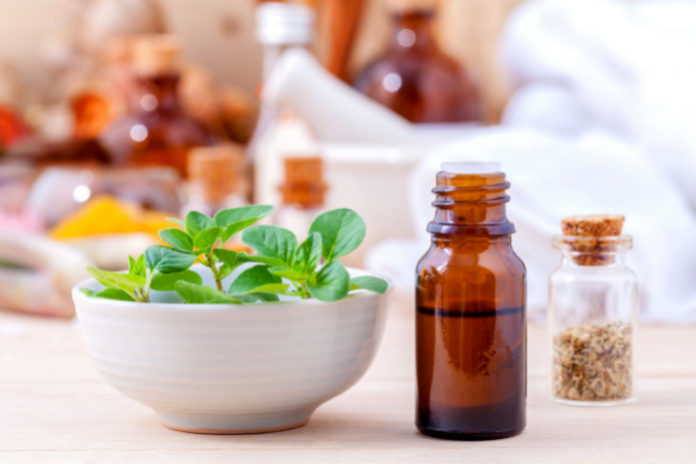Oregano oil is made from oregano or origanum Vulgare. It is an herb that belongs to the mint family. It is found throughout the parts of Europe, the Mediterranean, Central, and South Asia. For over 2500 years now, oregano has been considered a precious plant commodity in folk medicines across the globe. The medicinal oregano’s leaves and stems are left to dry. They are then distilled to extract the oil from the herb. The oil consists of compounds such as carvacrol and thymol. This helps in protecting the oil from toxins and fights against fungal infections.
Uses of Oregano Oil
The carvacrol compound present in the oil is said to be of a healing nature. This is used to treat several allergies and skin diseases. It also helps in protecting the skin. It helps in reversing or reducing bacterial infections, fungal infections, viruses, parasites, allergies, Candida, and indigestion.
Oregano oil is used as a natural remedy for a wide range of things because of its healing properties. The anti-bacterial, anti-fungal, and antiviral properties of the oil make it a more effective and healthier alternative. If taken orally, the oil can help resolve issues of indigestion and gastrointestinal diseases. It also helps in recovering from respiratory illnesses. When taken through steam, it helps in conditions of sinus and chest congestion. When diluted or taken topically, oregano oil can be used over skin for the treatment of acne, warts, athlete’s foot, and canker sores. It also helps in treating fungal and bacterial infections.
9 Amazing Health Benefits of Oregano Oil
Cancer-Fighting Properties
Carvacrol compound which is found in abundance in the oregano oil is said to possess cancer-fighting properties. Studies demonstrate that carvacrol has promising results against lung, breast, and liver cancer. Basically, the compound helps in inhibiting the growth of cancer cells and causes cancer cell death.
Relieves Pain
An animal study was conducted on mice to test the effect of painkillers and essential oils including oregano oil. Results suggested that the oregano oil was seen to reduce pain in mice, showing similar effects to that of the common painkillers. One other study conducted on rats showed that a higher intake of oregano extracts by the rats led them to feel lesser levels of pain. These results were likely because of the presence of carvacrol content.
Helps Lose Weight
Oregano oil has the ability to disrupt the formation and accumulation of fat tissue. In a study conducted on mice, they were given a high-fat diet along with carvacrol. Results suggested that even though after the intake of a high-fat diet the mice were seen to weigh less than those who were not given carvacrol with their diets. This proves that oregano oil can discontinue the growth of fat cells in the body. It was also said that adding oregano oil to daily use might lead to a healthier lifestyle.
Anti-inflammatory Properties
One of the major uses of oregano oil is that it helps in reducing inflammation. As the compounds present in the oil are anti-inflammatory in nature. A study suggested that these compounds prevented obesity by having an effect on the genes related to inflammation and it also reduced swelling.
Natural Antibiotic
Oregano oil is considered a natural antibiotic as it may help fight bacteria. Staphylococcus aureus is a very common cause of infections. It might aid food poisoning or skin infections can be eliminated by the oils intake. Intake can either be in the form of oil supplements or by applying it to the skin.
Fungal Infections
Overgrowth of yeast could lead to infections. Intake of oregano oil has shown progressive results against the most well-known yeast, Candida. It works effectively against 5 different kinds of Candida, such as infections caused in the vagina and mouth. High levels of thymol present in the oregano oil act as a potent anti-fungal agent.
Improves Gut Health
Gut parasites can cause several symptoms such as diarrhea, bloating, and pain. Oregano oil promotes gut health by killing gut parasites. It gives relief from pain, tiredness, and gut symptoms. A 6 weeklong study determined a change of about 77% of patients who were cured by the given dosage of oregano oil. The oil also protects the individual against a ‘leaky gut.
Lowers Cholesterol
Researches suggest its intake may reduce cholesterol levels. A study was conducted on high cholesterol patients where they were given oregano oil after each meal. It resulted in reduced levels of bad cholesterol LDL and higher good cholesterol HDL. Compounds such as thymol and carvacrol are said to stimulate this cholesterol-lowering effect.
Rich in Antioxidant
Thymol and carvacrol are two major antioxidant compounds that reduce oxidation. A test-tube study suggested that oregano is the most highly concentrated antioxidant. It was also found that it is richer in antioxidants than some fruits and vegetables, gram per gram. Antioxidants play a great role in protecting the body from the damage caused by free radicals.
How To Consume Oregano Oil
- For skin purposes, mix 1 teaspoon (5mL) of olive oil per drop of oregano oil and apply it directly to the skin.
- Can be taken in the form of capsule or tablets as prescribed by a doctor.
- In the form of a digestive aid tea. Steep 15 grams of oregano leaves in 250mL water for 5-10 minutes.
- As a natural antibiotic, dilute it with a carrier oil. Apply it on your sole or consume it internally for 10 days, once every day.
Side Effects/Risks of Oregano Oil
- It is usually not advised for pregnant or breastfeeding women to take oregano oil.
- Refrain it from infants as well.
- There are chances of burning the internal tissues if taken orally.
- The oil can interfere with several medications including lithium and diuretics.
- It is also a possibility that the individual might be allergic to the oil.
- Diabetic patients are not advised to consume the oil.
Resources:
https //www.ncbi.nlm.nih.gov/pmc/articles/PMC6152729.
https //pubmed.ncbi.nlm.nih.gov/32461309/













